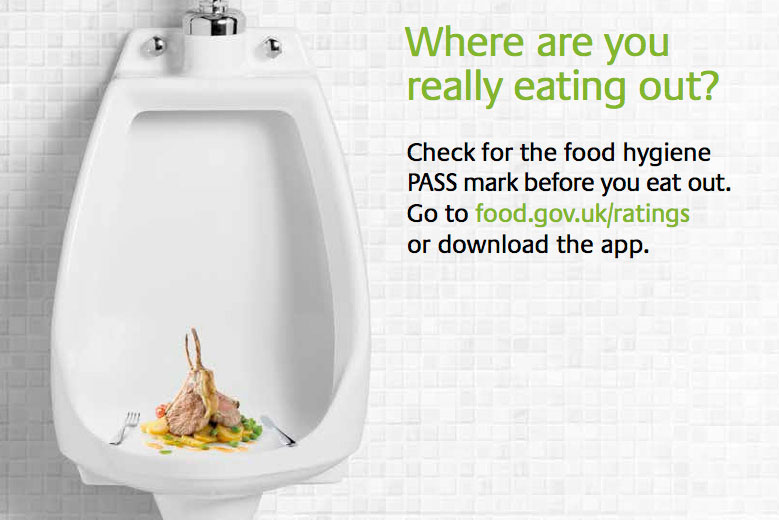
The Advertising Standards Authority (ASA) has dismissed a complaint against a food hygiene advertising campaign aimed at getting consumers to check hygiene standards before choosing where to eat out.
EBLEX (an organisation for beef and lamb levy payers in England), the National Sheep Association and one other unnamed complainant contacted the ASA claiming that the FSA’s campaign associated lamb with poor food hygiene and was misleading.
The National Sheep Association said it was 'appalled' by the advertising campaign which shows lamb chops in a urinal.
However, the ASA thought that it was unlikely the advertisement would mislead consumers about the safety of eating lamb and doubted they would see it as a comment about the meat used, rather than the hygiene issues highlighted.
The ASA added that the advertisement focused on the standards of hygiene of ‘where’ consumers would be eating, rather than what they would be eating and noted that the image of the lamb cutlets was ‘incidental’ and used to show high quality food in an environment usually associated with poor hygiene. As a result, they concluded that there were no grounds for further action.
"This advert is an absolute disgrace and portrays lamb is the worst possible way" said George Milne, NSA Scotland Development Officer.
"Sheep farmers in the UK produce lamb to such an incredibly high standard – we have farm assurance inspections, full food-chain traceability, in-depth animal health and medicine records – and now we are faced with this photograph of lovely lamb cutlets in the bottom of a toilet.
"Even if you understand the message of the advert, which is not easy when the image is wrapped around bus shelters and telephone boxes, it still casts red meat in a very poor light."
Stephen Humphreys, Director of Communications at the Agency, said: 'We are pleased that the ASA rejected this complaint. The campaign was designed to challenge assumptions that an establishment’s appearance alone is the best way to judge standards of hygiene.
We were simply reminding consumers to check hygiene standards when eating out. We always trusted the intelligence of consumers to realise we were making a point about the food establishments, not the food itself.'
The ad campaign, which ran from the 11 February 2013 and ended last month, was part of the FSA’s strategy to promote the Food Hygiene Ratings Scheme (FHRS) in England, Wales and Northern Ireland and the Food Hygiene Information Scheme (FHIS) in Scotland.
The schemes are run by local authorities, in partnership with the FSA. They aim to help consumers choose places to eat out or shop for food and help reduce the one million cases of food poisoning suffered by people each year.
